'People thought we were interns but we were in charge'
- Published
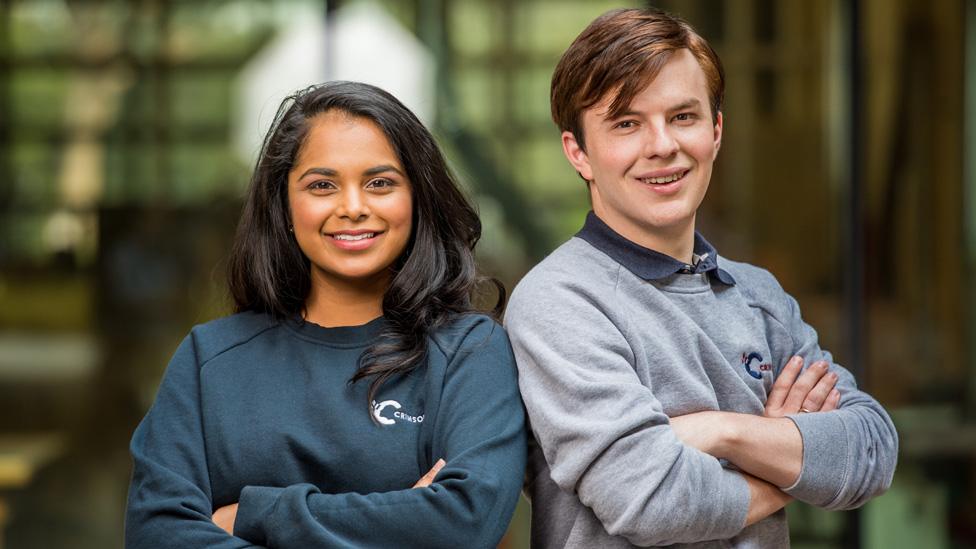
The young couple are said to still own 45% of their $160m business
The BBC's weekly The Boss series profiles business leaders from around the world. This week we speak to Jamie Beaton and Sharndre Kushor, founders of online tutoring company Crimson Education.
When Jamie Beaton and Sharndre Kushor were seeking investors for their business, the fact that they were teenagers caused some confusion.
"We'd sit down in these boardrooms, and everyone would be triple our age, lots of white hair and beige," says Jamie, now 23.
"We'd turn up and they'd think we were the assistants or the interns."
Thankfully for all concerned, boyfriend and girlfriend Jamie and Sharndre were not there on work experience, or to pour the coffees.
The New Zealand couple are instead the founders and bosses of Crimson Education, which they launched when they were both 18.
Aimed at high school students around the world, it links them with tutors and mentors to help them get into the best universities in the US and the UK.
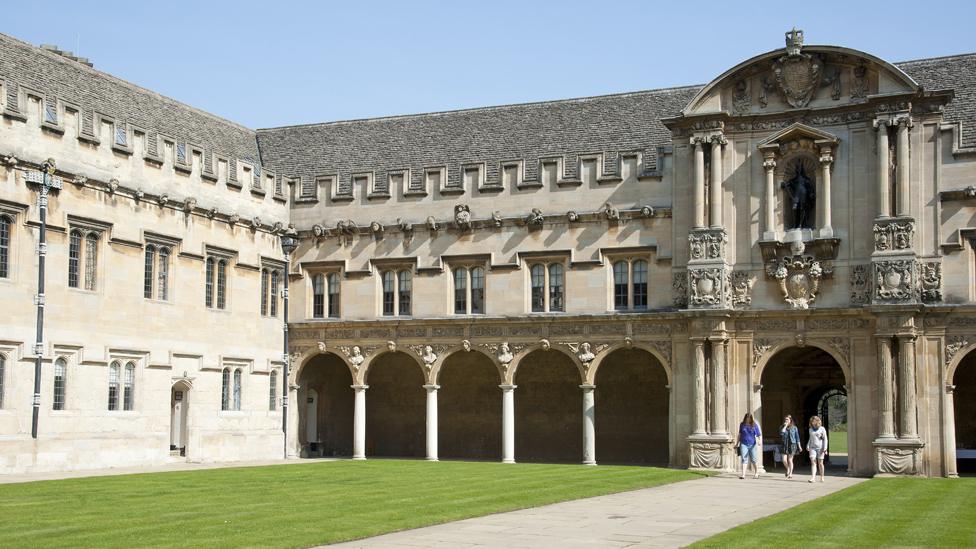
Crimson aims to help students around the world get into top UK and US universities, such as Oxford, pictured
When the couple started the business in Auckland in 2013 they were finishing their final year at school.
With no money to advertise, they instead reached out to friends and teachers, and put up notices on Facebook, to secure their first students and tutors. A year later Crimson gained its first $1m (£770,000) in funding, and it started to grow steadily.
Fast forward to today, and the company has reportedly secured a total of $37m in investment, which values it at $160m., external And it claims that more than 20,000 students around the world now use its network of 2,400 academics and career advisers.
Jamie and Sharndre started dating when they were two of 18 Kiwi students chosen to attend a Model United Nations event in The Hague, Netherlands. Model UN is a global scheme in which children and young adults learn about diplomacy and international relations by role playing as delegates to the United Nations.
"Our first date was at a Starbucks in a train station in Germany, while on the trip," says Sharndre, also now 23. She says she was impressed by Jamie's "do-or-die focus".
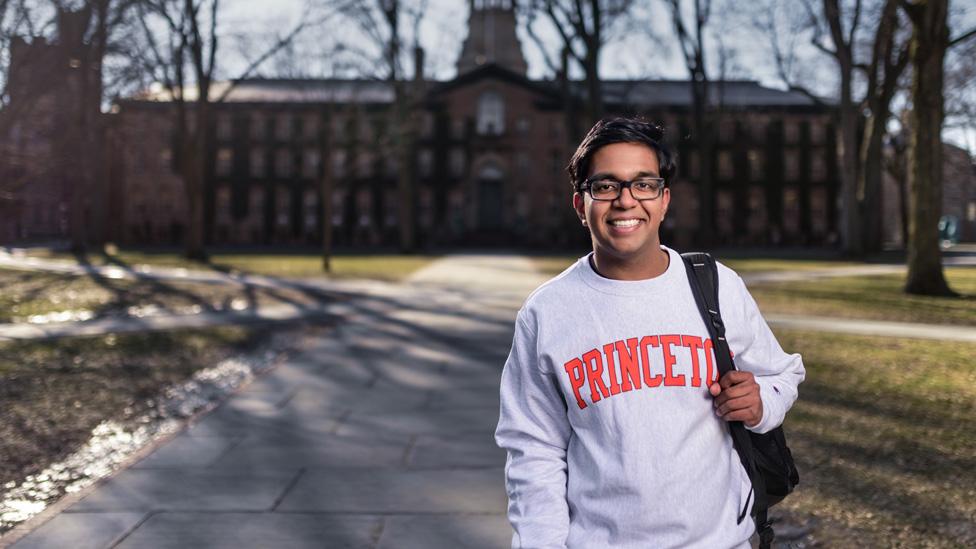
Most of Crimson's students come from New Zealand, Australia and across Asia, including Seyoon Ragavan from Sydney, who got into Princeton University
At the time Jamie had been accepted by Harvard University in the US to study applied mathematics. Given his academic achievements it is not hard to see why - in his final year at school in Auckland he sat and got top marks in 10 British A-levels (students usually sit only three or four).
He had actually applied to 25 of the world's highest-ranked universities, and all had said yes.
Sharndre, a youth ambassador for the United Nations Children's Fund, was also a high achiever. But she hadn't thought to apply to top-tier universities outside New Zealand.
So chatting about their futures, the new couple came up with the idea for Crimson.
"New Zealand universities are wonderful," says Jamie. "But generally, ranking-wise, the US and UK do a lot better in many areas.
"By the end of the trip [to Europe] we started to conceive some sort of coaching service."
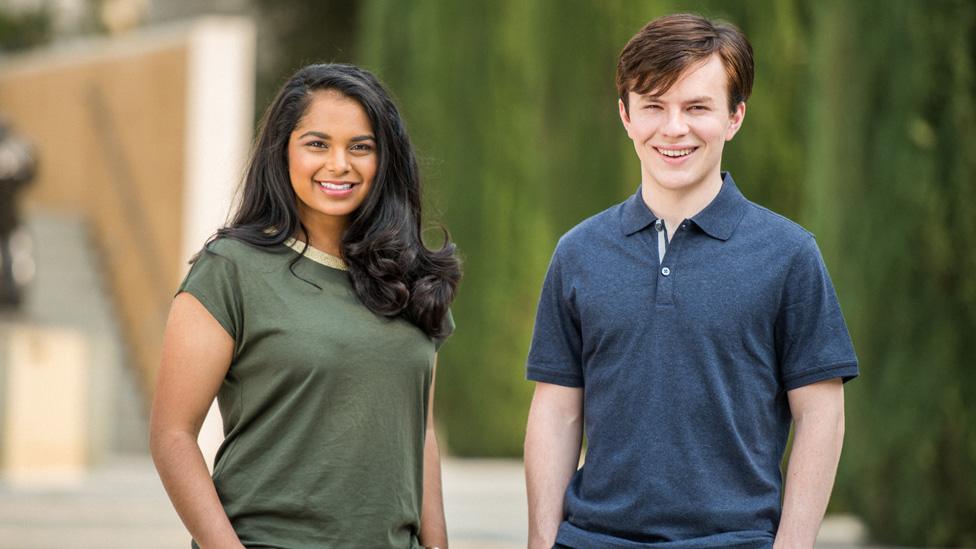
The couple have a relationship that is often very long distance
Launching the business, they soon had to juggle running it with keeping up with their university studies - and the fact that they were in different countries. While Jamie was at Harvard, Sharndre did a degree in population health at the University of Auckland.
Today Sharndre spends half the year in Auckland at Crimson's head office, and the other six months visiting its offices in 23 other cities around the world. Meanwhile, Jamie divides his time between Auckland and California, where he is doing a masters in education at Stanford University.
Crimson's mentors and tutors range from teachers and lecturers to former university admissions staff who can advise on the best ways to fill out application forms and how to conduct yourself in interviews.
The company says that students are not randomly connected to a mentor, and instead it uses a compatibility algorithm devised by J Galen Buckwalter, former chief scientist at dating website eHarmony.

More The Boss features, which every week profile a different business leader from around the world:

Most Crimson students currently come from New Zealand, Australia and countries in Asia - Singapore, China, Thailand, South Korea and Vietnam.
The company now plans to break into the US market, where there is plenty of competition from longer-established tutoring rivals such as Kaplan and Princeton Review.
Peter Zamborsky, a business lecturer at the University of Auckland, cautions that these larger businesses have flexed their muscles to take on Crimson in the online sphere.
"If these bigger firms see the market that Crimson is trying to tap as profitable, they can - and already did - step up their digital efforts," he says.
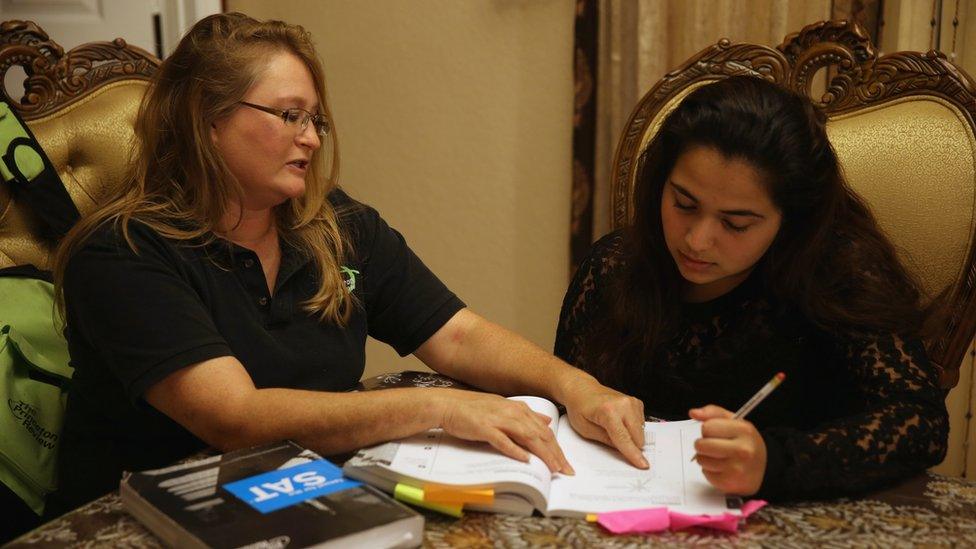
Princeton Review, better known for its in-person tutoring, is increasingly moving into the online sphere to compete with the likes of Crimson
While Crimson won't reveal an exact annual turnover figure, it says it is now "in the large eight figures".
Jamie, who is chief executive, and Sharndre, who is the chief operating officer, are reported to still own 45% of the business. This makes their stake worth $72m.
Sharndre says that while "the rule book" says you shouldn't be dating your business partner, for them it works well. "It's been the biggest blessing because you're working with someone every day that you really trust."
However, Jamie admits that the couple try to prevent perceptions that they might always agree by "overcompensating" in work meetings.
"Some of the boldest debates fly in the boardrooms between us two," he says.